Nissan Leaf vs VW T-Cross - Differences and prices compared
Costs and Efficiency:
Price and efficiency are key factors when choosing a car – and this is often where the real differences emerge.
VW T-Cross has a decisively advantage in terms of price – it starts at 21100 £, while the Nissan Leaf costs 30800 £. That’s a price difference of around 9694 £.
Engine and Performance:
Under the bonnet, it becomes clear which model is tuned for sportiness and which one takes the lead when you hit the accelerator.
When it comes to engine power, the Nissan Leaf has a distinct edge – offering 217 HP compared to 150 HP. That’s roughly 67 HP more horsepower.
In acceleration from 0 to 100 km/h, the Nissan Leaf is clearly perceptible quicker – completing the sprint in 6.90 s, while the VW T-Cross takes 8.40 s. That’s about 1.50 s faster.
In terms of top speed, the VW T-Cross performs clearly perceptible better – reaching 200 km/h, while the Nissan Leaf tops out at 157 km/h. The difference is around 43 km/h.
There’s also a difference in torque: Nissan Leaf pulls distinct stronger with 340 Nm compared to 250 Nm. That’s about 90 Nm difference.
Space and Everyday Use:
Beyond pure performance, interior space and usability matter most in daily life. This is where you see which car is more practical and versatile.
Seats: offers more seating capacity – vs .
In curb weight, VW T-Cross is clearly perceptible lighter – 1267 kg compared to 1580 kg. The difference is around 313 kg.
In terms of boot space, the VW T-Cross offers somewhat more room – 455 L compared to 394 L. That’s a difference of about 61 L.
In maximum load capacity, the VW T-Cross performs distinct better – up to 1281 L, which is about 491 L more than the Nissan Leaf.
When it comes to payload, VW T-Cross a bit takes the win – 480 kg compared to 415 kg. That’s a difference of about 65 kg.
Who comes out on top?
Overall, the Nissan Leaf shows itself to be performs better in key areas and secures the title of DriveDuel Champion.
It convinces with the more balanced overall package and proves to be the more versatile choice for everyday use.
 @ Nissan Motor Corporation
@ Nissan Motor Corporation
Nissan Leaf
Costs and Consumption
View detailed analysis
Engine and Performance
View detailed analysis
Dimensions and Body
View detailed analysis
Nissan Leaf
The Nissan Leaf is a practical, easygoing electric hatch that turns daily commutes into a quiet, effortless affair while offering more cabin space than it lets on. It’s a sensible, wallet-friendly step into electrification for buyers who value comfort and simplicity over sporty drama, though those chasing long-distance thrills might look elsewhere.
details @ Nissan Motor Corporation
@ Nissan Motor Corporation
 @ Nissan Motor Corporation
@ Nissan Motor Corporation
 @ Nissan Motor Corporation
@ Nissan Motor Corporation
 @ Nissan Motor Corporation
@ Nissan Motor Corporation
VW T-Cross
The VW T-Cross turns everyday practicality into a style statement, offering a roomy-feeling cabin, clever storage and playful design that suits town life and family duties alike. On the road it's composed and relaxed, rewarding buyers who want the raised seating and confident presence of an SUV without the weighty compromises.
details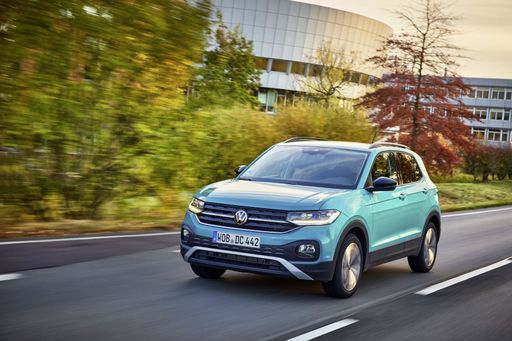 @ Volkswagen AG / VW Media
@ Volkswagen AG / VW Media
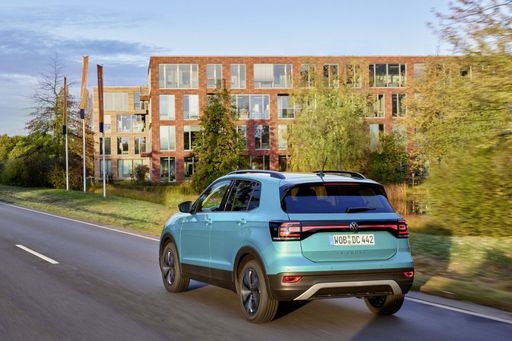 @ Volkswagen AG / VW Media
@ Volkswagen AG / VW Media
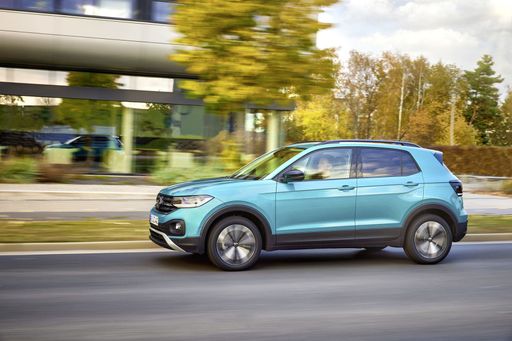 @ Volkswagen AG / VW Media
@ Volkswagen AG / VW Media
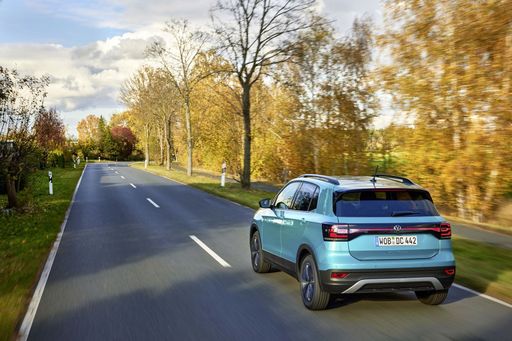 @ Volkswagen AG / VW Media
@ Volkswagen AG / VW Media
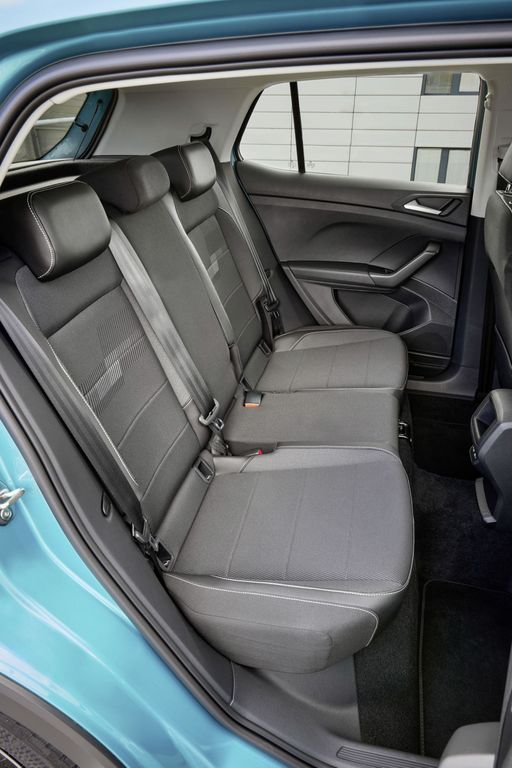 @ Volkswagen AG / VW Media
@ Volkswagen AG / VW Media
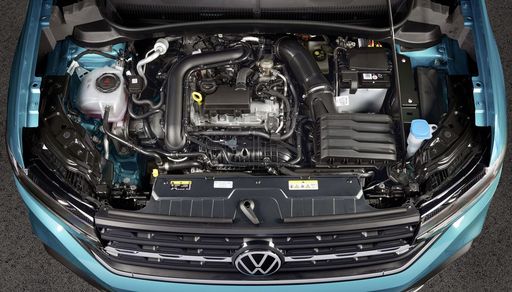 @ Volkswagen AG / VW Media
@ Volkswagen AG / VW Media
 @ Nissan Motor Corporation
@ Nissan Motor Corporation
|
 @ Volkswagen AG / VW Media
@ Volkswagen AG / VW Media
|
|
|
|
Costs and Consumption |
|
|---|---|
|
Price
30800 - 37200 £
|
Price
21100 - 31500 £
|
|
Consumption L/100km
-
|
Consumption L/100km
5.4 - 6 L
|
|
Consumption kWh/100km
16.7 - 17.8 kWh
|
Consumption kWh/100km
-
|
|
Electric Range
270 - 385 km
|
Electric Range
-
|
|
Battery Capacity
39 - 59 kWh
|
Battery Capacity
-
|
|
co2
0 g/km
|
co2
124 - 136 g/km
|
|
Fuel tank capacity
-
|
Fuel tank capacity
40 L
|
Dimensions and Body |
|
|---|---|
|
Body Type
Hatchback
|
Body Type
SUV
|
|
Seats
5
|
Seats
5
|
|
Doors
5
|
Doors
5
|
|
Curb weight
1580 - 1756 kg
|
Curb weight
1267 - 1338 kg
|
|
Trunk capacity
385 - 394 L
|
Trunk capacity
455 L
|
|
Length
4490 mm
|
Length
4127 mm
|
|
Width
1788 mm
|
Width
1784 mm
|
|
Height
1540 - 1545 mm
|
Height
1573 mm
|
|
Max trunk capacity
790 L
|
Max trunk capacity
1281 L
|
|
Payload
384 - 415 kg
|
Payload
463 - 480 kg
|
Engine and Performance |
|
|---|---|
|
Engine Type
Electric
|
Engine Type
Petrol
|
|
Transmission
Automatic
|
Transmission
Manuel, Automatic
|
|
Transmission Detail
Reduction Gearbox
|
Transmission Detail
Manual Gearbox, Dual-Clutch Automatic
|
|
Drive Type
Front-Wheel Drive
|
Drive Type
Front-Wheel Drive
|
|
Power HP
150 - 217 HP
|
Power HP
95 - 150 HP
|
|
Acceleration 0-100km/h
6.9 - 7.9 s
|
Acceleration 0-100km/h
8.4 - 11.3 s
|
|
Max Speed
144 - 157 km/h
|
Max Speed
180 - 200 km/h
|
|
Torque
320 - 340 Nm
|
Torque
175 - 250 Nm
|
|
Number of Cylinders
-
|
Number of Cylinders
3 - 4
|
|
Power kW
110 - 160 kW
|
Power kW
70 - 110 kW
|
|
Engine capacity
-
|
Engine capacity
999 - 1498 cm3
|
General |
|
|---|---|
|
Model Year
2019
|
Model Year
2024 - 2025
|
|
CO2 Efficiency Class
A
|
CO2 Efficiency Class
D, E
|
|
Brand
Nissan
|
Brand
VW
|
What drivetrain options does the Nissan Leaf have?
Available configurations include Front-Wheel Drive.
The prices and data displayed are estimates based on German list prices and may vary by country. This information is not legally binding.
